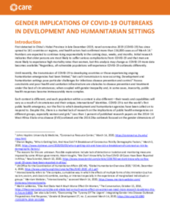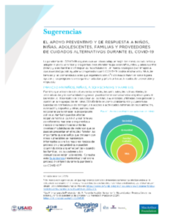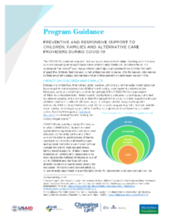Displaying 1691 - 1700 of 4400
This resource brings together new 2019 novel coronavirus disease (COVID-19) content from across The Lancet journals as it is published.
This article from UNICEF offers seven ways employers can support parents working to care for themselves, their children and their families during the COVID-19 outbreak.
This list of educational applications, platforms and resources below aim to help parents, teachers, schools and school administrators facilitate student learning and provide social care and interaction during periods of school closure.
This article from UNICEF outlines 8 tips for parents and caregivers on how to talk to children about the coronavirus.
This webpage from Save the Children features answers to frequently asked questions about the coronavirus, as well as advice for talking to your children about the situation.
This analysis from CARE highlights the impacts of the COVID-19 crisis on women and girls, including the increased risk of violence and/or separation from caregivers for children, particularly girls.
This page on the website for the Inter-Agency Standing Committee Gender-based Violence (GBV) Guidelines contains COVID-19-specific resources and pulls from the knowledge-base of ebola, zika and cholera outbreaks.
Este recurso de Changing the Way We Care ofrece una guía en la adaptación y/o el desarrollo de servicios y programas para continuar atendiendo de mejor forma a los NNA y las familias durante este periodo de tiempo de cambio constante, particularmente en el monitoreo virtual de niños, niñas, adolescentes, sus familias y para el personal de hogares de protección durante la pandemia de COVID-19.
Este documento de Changing the Way We Care utiliza un marco ecológico para mostrar como la pandemia del COVID-19 crisis podría afectar a los NNA, las familias y las comunidades y como ayudar a los programas a reorganizar, adaptar y priorizar las actividades de prevención y respuesta.
This brief from Changing the Way We Care uses an ecological framework to help illustrate how the COVID-19 crisis might impact the children, families and communities and how to help programs adapt, reorganize and prioritize prevention and response activities.




